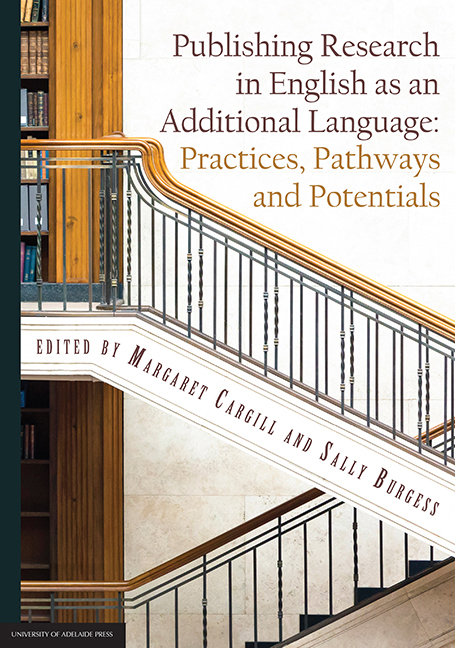Book contents
- Frontmatter
- Contents
- List of contributors
- Acknowledgements
- Foreword
- Introduction: Unpacking English for Research Publication Purposes [ERPP] and the intersecting roles of those who research, teach and edit it
- 1 Accept or contest: A life-history study of humanities scholars’ responses to research publication policies in Spain
- 2 Introducing research rigour in the social sciences: Transcultural strategies for teaching ERPP writing, research design, and resistance to epistemic erasure
- 3 Blurring the boundaries: Academic advising, authors’ editing and translation in a graduate degree program
- 4 The delicate art of commenting: Exploring different approaches to editing and their implications for the author-editor relationship
- 5 The CCC Model (Correspondence, Consistency, Correctness): How effective is it in enabling and assessing change in text-editing knowledge and skills in a blended-learning postgraduate course?
- 6 How credible are open access emerging journals? A situational analysis in the humanities
- 7 Disseminating research internationally: Intra-subdisciplinary rhetorical structure variation in immunity and allergy research articles
- 8 Scientists publishing research in English from Indonesia: Analysing outcomes of a training intervention to inform institutional action
- 9 ‘The one who is out of the ordinary shall win’: Research supervision towards publication in a Chinese hospital
- 10 The geopolitics of academic plagiarism
- 11 Training ‘clerks of the [global] empire’ for 21st-century Asia? English for Research Purposes (ERP) in Vietnam
- 12 Standardisation and its discontents
- Reflections and future directions in publishing research in English as an Additional Language: An afterword
3 - Blurring the boundaries: Academic advising, authors’ editing and translation in a graduate degree program
Published online by Cambridge University Press: 16 March 2018
- Frontmatter
- Contents
- List of contributors
- Acknowledgements
- Foreword
- Introduction: Unpacking English for Research Publication Purposes [ERPP] and the intersecting roles of those who research, teach and edit it
- 1 Accept or contest: A life-history study of humanities scholars’ responses to research publication policies in Spain
- 2 Introducing research rigour in the social sciences: Transcultural strategies for teaching ERPP writing, research design, and resistance to epistemic erasure
- 3 Blurring the boundaries: Academic advising, authors’ editing and translation in a graduate degree program
- 4 The delicate art of commenting: Exploring different approaches to editing and their implications for the author-editor relationship
- 5 The CCC Model (Correspondence, Consistency, Correctness): How effective is it in enabling and assessing change in text-editing knowledge and skills in a blended-learning postgraduate course?
- 6 How credible are open access emerging journals? A situational analysis in the humanities
- 7 Disseminating research internationally: Intra-subdisciplinary rhetorical structure variation in immunity and allergy research articles
- 8 Scientists publishing research in English from Indonesia: Analysing outcomes of a training intervention to inform institutional action
- 9 ‘The one who is out of the ordinary shall win’: Research supervision towards publication in a Chinese hospital
- 10 The geopolitics of academic plagiarism
- 11 Training ‘clerks of the [global] empire’ for 21st-century Asia? English for Research Purposes (ERP) in Vietnam
- 12 Standardisation and its discontents
- Reflections and future directions in publishing research in English as an Additional Language: An afterword
Summary
Introduction
The spread of English as a global lingua franca affects not only established scholars who use English as an additional language in order to publish their work in international journals. It has also created pressure on doctoral students at universities in non-Englishspeaking EU member countries to avail themselves of the European Doctorate and International Doctorate options introduced under the Bologna Plan. These options require PhD candidates to spend a period of at least three months in a university outside the country in which they will obtain their degree, and to write part of their PhD thesis in English so that outside examiners can read it. This requirement poses special challenges for both the students and their thesis supervisors.
This chapter is based on a doctoral thesis in cultural anthropology that I co-advised with another colleague in my department. The student in question is Ilaria Cover (I include her name with her permission). She is a native Italian speaker and a competent speaker and writer of Spanish who opted for the International Doctorate and decided to write her thesis entirely in English. Ilaria's co-supervisor, Angel Martinez-Hernaez, is a specialist in cultural studies of psychiatry and mental health with whom I have participated in two competitively funded research projects on depressive distress in adolescents and their strategies for managing it. We met 25 years ago, when I translated the book he published from his doctoral thesis on the concept of ‘symptom’ in psychiatry, and we have since worked together on many occasions, both as author and translator and as co-authors. We shared responsibility for advising the conceptual, theoretical and ethnographic aspects of Ilaria's thesis, but I was the only person in my department who could be Ilaria's editor, a role that included correcting her translations of material quoted from sources in Italian and Spanish and also the third-party translations of two chapters, one originally written in Spanish and the other in Italian.
Ilaria did her fieldwork in Egypt in the public psychiatric hospital of the city of Alexandria, with mostly women inpatients.
- Type
- Chapter
- Information
- Publishing Research in English as an Additional LanguagePractices, Pathways and Potentials, pp. 55 - 70Publisher: The University of Adelaide PressPrint publication year: 2017

